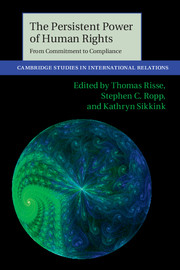Book contents
- Frontmatter
- Contents
- Figures
- Tables
- Contributors
- Preface
- Part I Introduction and stock-taking
- Part II Conceptual and methodological issues
- Part III From ratification to compliance
- 7 The normative context of human rights criticism
- 8 The United States and torture
- 9 Resisting the power of human rights
- 10 The “Arab Spring” and the spiral model
- Part IV From commitment to compliance
- References
- Index
9 - Resisting the power of human rights
The People’s Republic of China
Published online by Cambridge University Press: 05 March 2013
- Frontmatter
- Contents
- Figures
- Tables
- Contributors
- Preface
- Part I Introduction and stock-taking
- Part II Conceptual and methodological issues
- Part III From ratification to compliance
- 7 The normative context of human rights criticism
- 8 The United States and torture
- 9 Resisting the power of human rights
- 10 The “Arab Spring” and the spiral model
- Part IV From commitment to compliance
- References
- Index
Summary
Probably more than any other event in the last decade, the 2010 Nobel Peace Prize for human rights and democracy activist Liu Xiaobo confirmed to a global audience that the Chinese party state does not shy away from silencing its critics. The winner of the prestigious award sits in prison with hardly any chance for an early release despite numerous international calls for leniency. His wife was placed under house arrest, thereby cutting Liu’s only channel for communication with the outside world. China protested ferociously against Liu Xiaobo’s selection, and was the first country ever in the history of the prize that announced diplomatic and economic threats to prevent international diplomats from attending the award ceremony. Is this episode symptomatic for the power of human rights or, rather, for China’s power to resist human rights?
Considering the scope conditions developed for this volume, China must be viewed as a particularly hard case for the power of human rights to triumph over its opponents. As China emerges as a great power, her material vulnerability to external pressure continues to decline. With the growing importance in global affairs, notably in the aftermath of the 2008 financial crisis and the more recent European sovereign debt crisis, China’s social vulnerability to external pressure is also falling: rather than seeking to demonstrate compliance, Beijing rebukes its international critics with increasing confidence. At the United Nations, China continues to express commitment to human rights, but it simultaneously challenges core implications that derive from these norms (Kinzelbach 2012). Domestically, the Communist Party’s grip on power is firm. The total number of human rights activists in China is uncertain, and they are only loosely organized.
- Type
- Chapter
- Information
- The Persistent Power of Human RightsFrom Commitment to Compliance, pp. 164 - 181Publisher: Cambridge University PressPrint publication year: 2013
- 13
- Cited by

